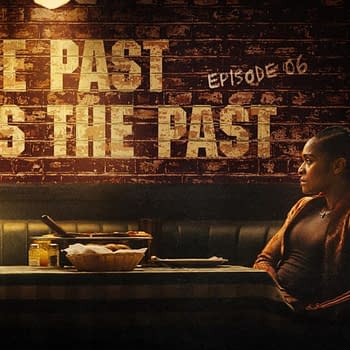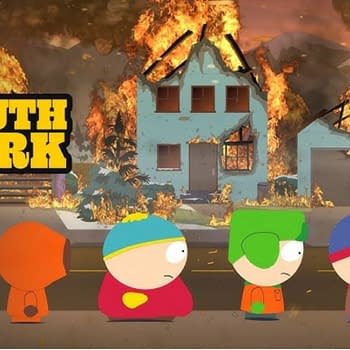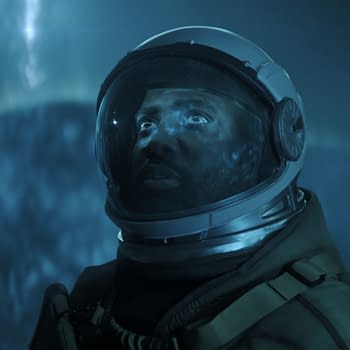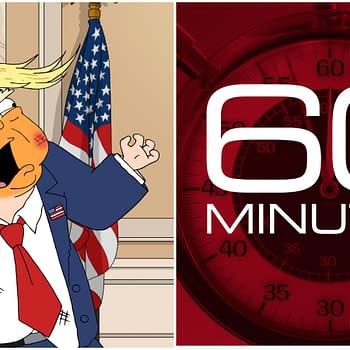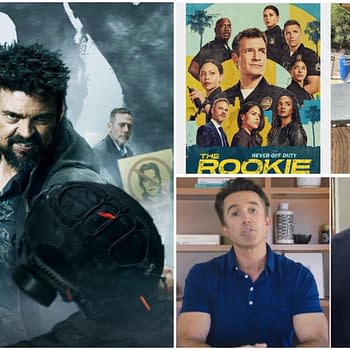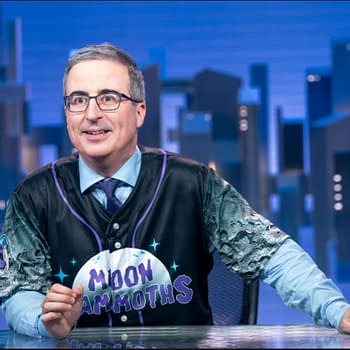Posted in: Netflix, streaming, Trailer, TV | Tagged: eskel, Geralt, Lauren S Hissrich, season 2, trailer, Witcher
The Witcher Showrunner Lauren S. Hissrich: "Let's Talk About Eskel"
As many of you know by now, when a property is being adapted for another medium then usually there need to be changes made along the way. Some things make the cut, other things get left on the editing floor, and even other things are changed to match the medium it's being adapted to. You see this the most when you're talking about books being adapted for film or television. In the case of Netflix's The Witcher, you have a property that's beloved both as a series of novels and video games so we're talking two particularly picky fanbases to keep happy. Series showrunner Lauren S. Hissrich is finding that out firsthand once again, with the fandom taking to social media to address how the series handled Geralt's (Henry Cavill) close friend & fellow witcher Eskel (Basil Eidenbenz). In response, Hissrich took to Twitter to offer a response and explain why certain decisions were made. Needless to say, we're turning on the "MAJOR SPOILERS AHEAD!" sign before going any further…
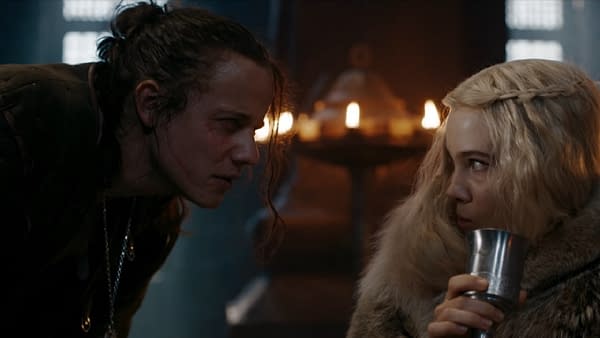
In a dramatic shift from the video game & book series, Geralt is forced to kill Eskel after he becomes infected by a leshy (a tree monster) and becomes a tree monster himself. Considering the role he would play in the video games and books, fans were more than a bit surprised (we're being kind) by the decision- especially after many viewers felt that they barely got to know the character or to develop a better understanding of the bond Eskel shared with Geralt. Now, Hissrich is following up on comments made during The Witcher: Unlocked to offer fans a better understanding of where the show's creative team was taking into consideration before the decision was made to kill the character:
"Let's talk about Eskel.
But before we do, we need to talk about Geralt. It's been well covered by the press that we wanted to delve into a deeper side of Geralt this season, unpeeling the layers of his intelligence and vulnerability and — most important — how he was formed by the family who raised him.
In the books, Geralt struggled with what it meant to be not just physically responsible for Ciri, but emotionally; however, in the show, in both writing and performance, Geralt had already learned a lot about loving and being loved from his brothers and from Vesemir.
The conflict for our Geralt wasn't about how to be a father… but the lengths he would go to protect his child of surprise.
Articulating Geralt's journey on screen had one other big challenge for us: namely, that in BoE, his time is mostly spent watching and taking in Cirilla and her powers so that he could understand the breadth of what he had promised Calanthe, and how best to protect the girl from future threats that hadn't yet presented themselves. In print, it's a gorgeous unfurling of listening and learning, a slow and steady beautiful journey of how a Witcher becomes a father. Of course, because of the above, Geralt's journey needed adjusting. But more than that, after writing several drafts of episodes, we faced an undeniable truth: that most tv audiences don't want to watch 8 episodes of any character watching and waiting and reacting, much less the titular character with whom swords and adventure and bathtubs have become synonymous.
Book fans may feel differently. I understand that.
But we had a handful of scripts that felt too staid and slow to engage viewers again after what we knew (by then) would be a 2 year hiatus. So how could we take the growth that we need to see in Geralt, but have it have all the appropriate ups and downs and cliffhangers and devastation and action that modern audiences expect? Enter the idea of a mystery Geralt needs to solve in order to learn about Ciri and her powers. And enter the idea that the mystery should unfold in the place where Geralt should have felt most protected and safe: his home.
With his family. With the people he knows best.
Except what happens when one of those people comes back home and is acting completely differently than what Geralt expects? One of my favorite moments on screen is when Geralt first hugs Eskel. The concern and confusion on his face says it all: "Are you okay?" And Eskel's not.
He's been infected by a monster that we don't know yet, who is connected to Ciri in a way we don't understand yet (and won't for a while). But from the get-go Geralt knows this person so well, and can't understand why he's acting out of character: mean, and coarse, and flagrantly disobeying Kaer Morhen rules by bringing women there, disrespecting the other brothers with whom he shares a deep history. The story unfolds, of course, as you've seen. Eskel admits he came home to seek help from Vesemir and his brothers, but the monstrous infection has taken over so deeply that he's lost himself. Geralt makes a choice that breaks his heart: he sacrifices Eskel to save Vesemir.
And now we have a mystery for Geralt to solve: what happened to Eskel? And how does it involve Ciri?
And further to that, we've got a dilemma that will play out through the whole season: just how far will Geralt go to protect the girl that is his destiny? What wins out: being a witcher, or being a father? Can he save both? And how?
We had several more flashbacks with Eskel laid out, to demonstrate further to the audience how close Geralt and Eskel were in the past: to reinforce just how far Geralt had had to go in his heart in order to make that sacrifice. I hope to return to them in the future.
All of that said: fans miss Eskel. I understand that. I also understand that we made the choice we needed to make in our storytelling, in order to activate Geralt. Is there a right and wrong? For fans, maybe. And maybe time will tell, for us too.
Off to watch House of Gucci. Our family will fare better than theirs — because having survived heartbreak in S2, ours comes together in S3. And having set out how much they inform Geralt's familial relationships, I don't think we're done with the Witcher brothers of Kaer Morhen."
Netflix's The Witcher season 2 welcomes Kristofer Hivju (Game of Thrones) as Nivellen, Kim Bodnia (Killing Eve) as Vesemir, Yasen Atour (Young Wallender) as Coen, Agnes Bjorn as Vereena, Paul Bullion (Peaky Blinders) as Lambert, Aisha Fabienne Ross (The Danish Girl) as Lydia, Adjoa Andoh (Bridgerton, Silent Witness) as Nenneke, Cassie Clare (Brave New World, The Bisexual) as Philippa Eilhart, Liz Carr (Silent Witness, Devs) as Fenn, Simon Callow (A Room with A View, Four Weddings and a Funeral) as Codringher, Graham McTavish (Outlander, Preacher) as Sigismund Dijkstra, Kevin Doyle (Downton Abbey, Happy Valley) as Ba'lian, Chris Fulton (Bridgerton, Outlaw King) as Rience, and newcomer Mecia Simson as Francesca.
Netflix's The Witcher stars Henry Cavill (Justice League) as Geralt, Anya Chalotra (The ABC Murders) as Yennefer, Freya Allan (The Third Day) as Ciri, Joey Batey (The War of the Worlds) as Jaskier, MyAnna Buring (Kill List) as Tissaia, Tom Canton (Good Karma Hospital) as Filavandrel, Lilly Cooper (Peterloo) as Murta, Basil Eidenbenz (Victoria) as Eskel, Jeremy Crawford (Titans) as Yarpin Zigrin, Eamon Farren (Twin Peaks) as Cahir, Mahesh Jadu (Marco Polo) as Vilgefortz, Terence Maynard (Cursed) as Artorius, Lars Mikkelson (House of Cards) as Stregobor, Mimi Ndiweni (Black Earth Rising) as Fringilla Vigo, Royce Pierreson (Judy) as Istredd, Wilson Radjou-Pujalte (Hunter Street) as Dara, Anna Shaffer (Harry Potter) as Triss Merigold, and Therica Wilson Read (Young Wallender) as Sabrina.




